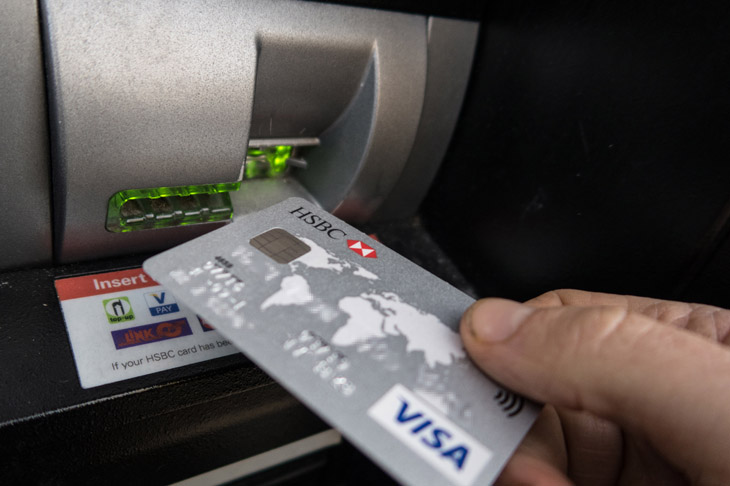Almost a decade after the financial crisis loomed, our high streets and town centres are full of life again: who ever thought consumers could sustain so many cafés, bakeries and nail bars? But the revival is being undermined by yet another wave of bank branch closures, leaving small businesses adrift and personal customers at the mercy of call centres and insecure, ill-designed online platforms. More than a thousand branches have closed over the past two years, and another 400 or so are scheduled to go soon. HSBC is showing the way with a savage cull of its network.
Oh well, you might say, banking really ought to be a digital business by now, and if high streets are so vigorous, those redundant premises will swiftly be filled by hipster artisans doing all manner of delightful things. After all, RBS tells us that the number of visits to bank counters has fallen dramatically since 2010, while phone-based transactions have quadrupled.
But cash and cheques are still part of daily life and we need places to put them, as well as people to ask about loans and savings. And pity the shopkeeper who is also a National Lottery franchisee in a small town with no banks and a post-office counter at the back of a mini-supermarket; his only means of banking his cash takings is to drive, several times a week, to a bigger town; and that journey may be about to get longer.
Closures are so commonplace that they no longer stir protest as they once did — but they should, because the ecology of the high street is delicate. Anthony Browne of the British Bankers’ Association says: ‘Banks are very aware no customer or business should be left behind and branches play an important role in local communities.’ Quite so; rather than decimating their networks, banks should be developing technologies (such as video links to financial advisers elsewhere) that help branches stay viable, and finding creative uses for spare space. Let’s have a Spectator campaign. Tell me how banks are behaving near you, if they’re still there at all: martin@spectator.co.uk.
Save Dodd-Frank
Should we be for or against Dodd-Frank? And what exactly is it? The answer to the second question is that it is the Wall Street Reform and Consumer Protection Act, passed by Congress in 2010 in the aftermath of the financial crisis to restrict US banks’ trading activities and force them to strengthen their balance sheets; many bankers howled at the time that it would be a burdensome drag on recovery and growth. But if President Trump has just signed an executive order signalling his intention to repeal Dodd-Frank, the answer to the first question is that we had better be for it.
As Mario Draghi of the European Central Bank observed, the last thing we need now is deregulation that encourages the banks to take leave of their senses again. The repeal would also suck some toxic trading back to New York from London — and you might say America would get what it deserves for electing the Donald. But as in 2008, it would be the world’s problem.
Unmellowed
When I met Sir Ken Morrison in his later years (he died last week aged 85), he looked and sounded very much like the livestock farmer he became after he stepped aside, with furious ill-grace, from running his supermarkets. Unmellowed by his £770 million fortune, he was unforgiving of those who had ever crossed him; one who did so described him to me as ‘a monster’. Yet Yorkshiremen were proud of him, both for embodying our county’s bloody-mindedness and for facing down doubters with his 2004 bid for southern-based Safeway.
The problems of integrating the two businesses led to losses, strife and Sir Ken’s own kicking upstairs as chairman, notionally non-executive but still breathing fire. What really riled was the insinuation from City analysts that Morrisons’ ‘northern’ offering — supposedly heavy on pies and pork products — could never appeal to the Home Counties housewife who dreamed of Waitrose. So it was gratifying that, by the time he vacated the chair in 2008, his stores’ value-for-money fresh-food formula was rapidly gaining ground against its rivals. And even though he eventually sold most of his personal holding (reinvesting some of it in Sainsbury’s), he must have been quietly pleased to see Morrisons’ shares bouncing from 140p to 240p in the past year.
Virtuous occupation
I wasn’t moved to join the anti-Trump rally I saw forming up near the US embassy on Saturday morning: I haven’t been on a protest march since (by mistake, to be honest) I occupied Oxford’s Examination Schools in 1973; and as Rod Liddle says, there’s just too much virtue-signalling these days. But I did find myself in sympathy with another short-lived occupation — of an empty mansion in Eaton Square, by the Autonomous Nation of Anarchist Libertarians. I gather the house belongs to Andrey Goncharenko, a Russian of whom little is known other than that he made money in property, forestry and haulage in the 1990s and went on to chair part of the state energy giant Gazprom. He’s believed to own, through various companies, a quartet of palatial London properties— in Regent’s Park, Hampstead and St James’s Street as well as his Eaton Square gaff — though it’s not known what he plans to do with them.
I’m not suggesting that being foreign and mysterious in any way diminishes this gentleman’s right to have squatters evicted. But the Autonomous Nation was only behaving like so many other self-styled communities these days, acting upon self-interested, self-righteous but sincerely held beliefs. Furthermore, empty homes are a blight on London, just as baleful oligarchs are a blight of a different kind. In return for the privacy and protection Britain offers, they should be transparent in their dealings and go out of their way to be generous: a helping hand for homeless anarchists might be a worthy start.







Comments